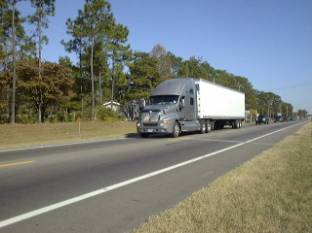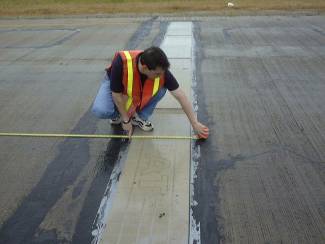U.S. Department of Transportation
Federal Highway Administration
1200 New Jersey Avenue, SE
Washington, DC 20590
202-366-4000
Federal Highway Administration Research and Technology
Coordinating, Developing, and Delivering Highway Transportation Innovations
|
LTPP News This newsletter is an archived publication and may contain dated technical, contact, and link information. |
|
| Publication Number: Date: May/June 2005 |
Issue No:
Vol. 1 No. 2
Date: May/June 2005 |
| Email Distribution List |
|
| Contact |
Customer Service
|

Whether you are sitting in it or trying to manage it, traffic can be very challenging. However, a challenge can be fulfilling if it is approached with the right attitude and given a sound plan to properly address the challenge.
Initiated by the Transportation Research Board (TRB) Expert Task Group (ETG) on Long-Term Pavement Performance (LTPP) Traffic Data Collection and Analysis (or Traffic ETG), a plan was set in motion to help address the challenge LTPP faces in terms of the quantity and quality of traffic data at the Specific Pavement Study (SPS) test sites. This plan, formally called the LTPP SPS Traffic Data Collection Pooled-Fund Study TPF-5(004), is a five-year study with the objective of collecting at least five years of research quality data at select SPS sites. Research quality data is defined to be at least 210 days of data (in a year) of known calibration meeting LTPP precision requirements.
This study is divided into two phases that run concurrently. Phase I consists of assessing existing Weigh-In-Motion (WIM) equipment that has the potential for meeting the precision requirements, and performing annual field validations on the SPS WIM equipment to make sure it continues to meet the precision requirements for the five-year study. Phase II involves determining if a site is suitable for installing a WIM system, installing and maintaining the system, and providing a five-year warranty of the system after installation. From a performance perspective, the preference is to have every WIM installed in rigid pavement. The rigid pavement will provide the smoothness needed as vehicles pass over the WIM. It is also likely that the pavement will remain free of any surface distress (such as rutting) that might influence vehicle motion as it passes over the WIM, hence affecting the quality of data collected by the system.
Under the Phase I activities to date, 34 sites have been assessed and 5 sites validated. The findings thus far have told us that we just are not getting the quality of data we thought we were getting from the current WIM systems. Calibration and validation activities at existing WIM sites are not occurring as frequently to keep the systems in proper balance and some sensors are simply approaching the end of their design life and need replacement. Out of the 34 site assessments at existing WIM locations, no site was recommended for field validation without first making some corrective action. Some corrective actions included grinding the pavement to improve the smoothness and modifying the classification algorithm. However, the majority of the corrective actions involved replacing the existing equipment. Many of the 34 sites are instrumented with piezo systems installed between 3 and 5 years ago. The likelihood of these systems lasting another 5 years is very small. This summer, the Phase II contractor will install new WIM systems in Maryland and Illinois. They will also evaluate additional SPS sites to determine if they are suitable for installing new WIM equipment. The approved equipment (Bending Plate, Load Cell, or Quartz Sensor) used for this study meets the specifications for a Type I WIM system as defined in ASTM Standard E1318-02.
With this background information about the study and a summary of some of the initial findings, now is a good time to answer the question, Why participate in the SPS Traffic Data Collection Pooled-Fund Study? First of all, participating ensures that traffic data is being collected in the same manner across states.Depending on an agency's level of participation in the study, it reduces the staffing resources the agencies currently must provide for collecting and providing traffic data to the LTPP program. It provides a warranty on newly installed WIM systems. It ensures that the same contractor (Phase II) installs and maintains the WIM systems and the same contractor (Phase I) verifies the performance of the system. It establishes the same guidelines for all 84 SPS test sites across North America. 100% of SP&R funds can be used to finance this study (including the construction of the concrete slab for the WIM system). Finally, it allows FHWA to better manage the data collection activities for the LTPP SPS traffic program. The end of this 20-year research study is fast approaching, and it is paramount that quality data are collected and stored in the database for future analysis projects and use in the new M-E design guide.
The LTPP program cannot solve all the traffic challenges the highway community faces. However, this pooled-fund study will help to fill-in the gaps that currently exist at the SPS locations. We are not quite there yet, but we are well our way.

Detailed information on Phases I and II, including the Technical Proposals are available on the web at: https://www.fhwa.dot.gov/pavement/ltpp/spstraffic/index.cfm. For more technical information about the study or questions on how to join, please contact Ms. Deborah Walker at (202) 493-3068 or email deborah.walker@fhwa.dot.gov.
The Technical Advisory Committee of this pooled fund study held a meeting in Albany on April 27-28, 2005 hosted by the New York Department of Transportation. Thirteen out of fifteen states were represented. Cornell University researchers gave an update on their progress and the Committee prioritized future work items.
For more information on the study, visit https://www.fhwa.dot.gov/pavement/ltpp/fwdpool.cfm, or contact Mr. Eric Weaver at (202) 493-3153 or email eric.weaver@fhwa.dot.gov.
FHWA recently published the following two new LTPP reports that are now available for viewing and printing on our website: